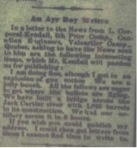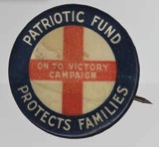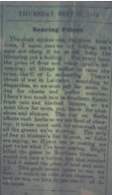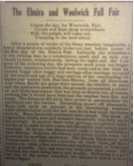The Elmira Signet released an article urging members of the Waterloo Region to join the war cause that was occurring nation wide. This editorial points towards the universal aspects of the war effort by saying “even the farmers, who generally escape the many calls for charity which come to the merchant and business men, have taken action.” Without the demand from the city centers the agricultural industry of the area would be feeble. This, the Signet claims, means the farmers must show their loyalty to the nations multiple causes in order to maintain favour with the local communities they supply. The article urges local farmers of the region to contribute their surplus food to the war effort as the battle rages on in Europe.
(“All Should Help,” Elmira Signet, 17 September 1914)






